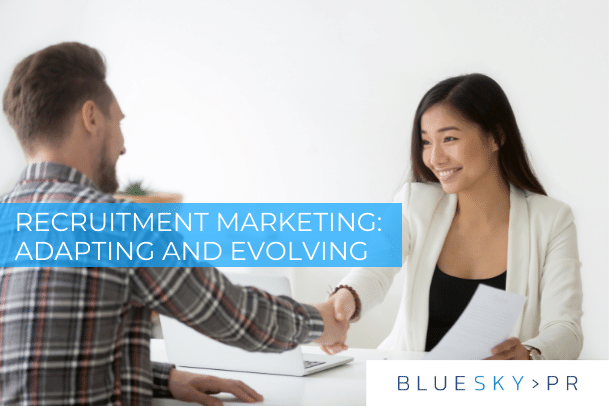
Why prioritising PR is crucial for recruitment firms in 2024
In uncertain economic times, investing in your brand's PR and visibility should be a top priority, not an afterthought. Gaining a consistent media presence and standing out from the immensely crowded recruitment landscape are key competitive advantages as we head into the challenges of 2024.

B2B PR: How to effectively raise your business profile
If you're new to the world of PR and looking to raise your business profile in the B2B (business to business) space, you might be wondering just how effective B2B PR can be for your firm. The truth is, when done well and done properly, B2B PR strategies can deliver fantastic results and be hugely effective for any recruitment firm. However, the challenge lies in getting it right from the start. In this blog post, I'll explore some actionable tips to help you make B2B PR work effectively for your recruitment agency.

Recruiters - Marketers are in high demand / short supply!
With the latest research from APSCo finding that jobs for marketeers were up 130% in 2021 on 2020 and recruitment agencies themselves victims of the ‘great resignation’ - if you're struggling to hire a recruitment marketer then perhaps it's time for to consider outsourcing all or part of your marketing function?

Authentic PR and marketing: What is it and why does it matter?
Any recruitment agency owner that has had limited interaction with outsourced PR and marketing support (or, indeed, a particularly bad experience with a less than reputable agency) might not automatically think of ‘authentic’ as being a key part of public relations or marketing. But authenticity is crucial in any content you’re pushing out.

Recruitment marketing trends for 2021
While 2020 was without doubt a challenging year for us all, many will have entered the New Year with some sense of optimism. And while the announcement of another national lockdown has certainly put a dampener on some of the positive forward planning that staffing companies had begun, the simple fact is this: we’ve been here before and we know what can help businesses survive.

Creating a marketing and PR strategy that really works
The New Year is always a great time for new beginnings and new objectives. And for recruitment agencies, it’s a great time to plan for the year ahead – and what a year it’s looking to be. What lies in store for the UK economy is certainly unknown. Indeed, the only certainty is uncertainty. For every business, now is the time to look at how to weather the storm and, in my view at least, having a robust marketing and PR strategy in place will prove hugely valuable in the coming months. In fact, this formed the topic for a recent webinar I hosted with my colleague Dan. So how can recruiters and marketing teams create a strategy that’s impactful, relevant and can withstand the potential changes that lie ahead? Start at the beginning It might sound like an obvious statement, but when setting out your plans for the coming months, it’s vital that you take a step back and consider the ‘why’ before the ‘how’. Defining exactly what you want to achieve from any activity and why, will put you in a far greater position to see demonstrable results that are aligned with your agency’s growth plans. And while of course the most ambitious firms might have a number of objectives, being minimalistic will often deliver greater results than taking an all-encompassing approach. By trying to cover all bases at once, you’ll be spreading resources rather thin and, as a result, will be unlikely to see the desired impact. Instead, setting three clear targets to begin with and investing time and energy in achieving this will deliver greater ROI.

Why thought leadership PR content is more important than ever
For those of you who have heard anyone from BlueSky PR present in person or on webinars, you’ll have no doubt heard us talking about thought leadership PR and content. If you haven’t, here’s a quick explanation: thought leadership PR comprises content and communication that demonstrates your knowledge, experience and skills, with little to no sales pitch. It leaves your target audience with a real understanding that you are 100% in tune with the sector you work in.

Specialist versus generalist PR agency: Which is best?
When it comes to partnering with a PR firm, there are a number considerations to factor into decisions. However, quite often one of the questions we come across is whether a recruitment business should go for a generalist firm or a specialist agency. While there are benefits to both, for staffing companies in particular, having a niche expert on board can often provide the greatest return on investment.

Recruitment marketing tips: What is employer branding?
When I’m speaking to new contacts in the recruitment and HR sphere I often find myself being asked during recruitment marketing discussions: “what is employer branding and why does it matter?” (this usually stems from a conversation where I’m explaining what we do here at BlueSky PR that makes us more than just a PR firm!) So, having faced the question again recently, I thought now would be a great time to jot down some useful information.

What are the key success factors for recruitment marketing implementation?
As more staffing companies get back to the office, it’s encouraging to see much more positive chatter in the hiring landscape. And there’s certainly been an uptick in the number of firms starting to once again get their communication and PR activity running. But the successful implementation of recruitment marketing strategies is reliant on a number of factors. While this certainly isn’t an exhaustive list, the below tips will certainly help businesses hit the ground running.

Why PR and BD are the perfect match for recruitment client conversion
Recruitment marketers have faced a common challenge for a long time now: getting consultants on board with PR activity. We all recognise the frustration. Those in the profession know that the best and most impactful marketing and content strategies are ones that everyone in the company supports. Whether that’s through sharing press coverage and blogs, being active on social media or contributing to the content themselves, having recruiters involved in PR will be hugely valuable in driving up engagement levels.

Latest Covid-19 news: what does it mean for recruiters?
The UK eagerly awaited the scheduled announcement from the Prime Minister on Sunday 10th May, with the expectation of lockdown being eased a prediction of the hopeful, while the realists among us perhaps knew that it’s still too early for that. And while there remains to be some clarity on exactly what we can and can’t do (remember, you can go out but you can’t, and go to work but don’t travel, and don’t go to work if you can work from home – and please, PLEASE stay alert, whatever that’s supposed to mean) one thing is for sure: uncertainty remains. So just what does the latest Covid-19 news mean for recruiters and what should we all be doing more of to keep battling on?

Lessons from history: how recruitment can survive a recession
With talks of GDP falling and a recession on the cards, I thought it pertinent to write a blog on how recruitment can survive a recession. As someone who started her PR career as the financial crisis hit, I’ve witnessed first-hand from the first day of my working life what tactics do and don’t work during turbulent times like these. Of course, I’m not suggesting that these approaches will work on a blanket basis, no one can definitely say that if you do X, your business will survive. But we’re all human, and part of what makes us all so great is our ability to learn (well some of us anyway – I’m still waiting for my husband to learn to put laundry IN the wash basket, not next to it).

Five uplifting stories in times of crisis to put a smile on your face
The last few weeks have certainly been trying times for many of us. As most of the world goes into ‘lockdown’ in an attempt to tackle the coronavirus pandemic, and the news is inundated with statistics and updates of cases, it can be difficult to remain positive. However, during tough times we see many cases of community support emerge – and there are many of them we should celebrate during this period of difficulty. Here are five uplifting stories which have surfaced from this time of crisis which will help put a smile on your face.

Recruitment PR lessons from the Apprentice finalists
In my last Apprentice blog I outlined the reasons why I thought Scarlet would win. Then Lord Sugar hired Carina. Now I'm not going to lie, in the lead up to the final it appeared that the head hunter had the most ideal business proposal – and I truly believe it still is, even if she didn't win. However, Carina absolutely pulled it out of the bag in the last show of 2019 and completely deserved the win. As both candidates arguably fared well in the final, for my last blog post I want to outline the recruitment PR lessons both individuals demonstrated well.

PR for Recruiters: Why are we back to CV lies in the Apprentice?
I genuinely cannot believe that we’re talking about lies on CVs once again on the Apprentice. It seems like only yesterday when Lee McQueen (another recruiter) was caught out in the interview stage for making false statements, but it was actually 11 years ago this was first aired. Then seven years ago, we saw another candidate from the employment sphere – Ricky Martin – also face the wrath of the interviewers for claiming to be a member of APSCo when, in fact, he wasn’t. And it looks like we’re three for three when it comes to lies from recruiters on the Apprentice. Here’s some of the recruitment PR lessons from the penultimate episode of the 2019 show.

Recruitment Marketing Lessons from the Apprentice
Normally I focus on the PR lessons we can learn from the latest episode of the Apprentice, however this week it makes absolute sense to focus on recruitment marketing instead. Afterall, it was a marketing challenge – or fail for some.

PR for recruitment firms – what we can learn from the Apprentice
I couldn’t bring myself to write this blog post straight away for one simple reason: I am absolutely gutted that Thomas has gone. Don’t get me wrong, his team deserved to lose and he made a fundamental mistake in this latest task. But, he was a genuinely likeable personality (very hard to find in the realms of reality TV shows these days). And I think that’s one of the crucial lessons we should all take away when it comes to PR for recruitment agencies: being authentic.

Recruitment PR lessons: predictions for tonight’s Apprentice
As the UK eagerly awaits the next episode of the Apprentice (ok, I might be slightly exaggerating there!) I thought I’d be a bit different with my regular blog posts and outline my predictions for what recruitment PR lessons we can expect this week.

Recruitment PR Tips from the Apprentice
If you’ve been following my recent blogs, you might have guessed that my opinion of the Apprentice isn’t great. There’s a wealth of flaws in the process itself that I find frustrating – what value is it to a potential business partner to see if someone can design a rollercoaster when the product they’re seeking investment for is a beauty cream, for example. BUT, the show does give me plenty of recruitment PR tips to talk about. So, as much as my family are probably fed up with me shouting at the TV on a Wednesday night, I’ll keep watching and keep writing. Here’s my thoughts from last night’s car (or rollercoaster) crash.

Recruitment PR lessons from the Apprentice: A million-pound failure
I may be wrong here, but from my personal recollection I can’t remember a group on the Apprentice ever being thrashed as much as Team Unison did last night (and how ironic is the name considering the complete disarray they all fell into!). You could almost pinpoint the moment their hearts sank as it was revealed that Empower had sold over £1 million, while Unison failed to even reach £500,000. In my view, so much went wrong for the losing team last night that I can’t give you a concrete recruitment PR lesson. But I can give three.

The PR recruitment lessons from the Apprentice: Episode three
I’m not going to lie, I was slightly concerned when I committed to writing a weekly reaction to the Apprentice and the relevant lessons in PR for recruitment firms, but the show seems to keep on giving! Indeed, before we were even half way into the latest episode, I had my top advice outlined and, had I been a gambling woman, I would’ve successfully bet on which team would lose.

Recruitment PR lessons from week two of the Apprentice
Hands up who watched the Apprentice last night and found themselves arguing with the TV? I know I did! Once again in typical Apprentice fashion we witnessed a team fail miserably in what should arguably have been a relatively simple task. And yet again, I have a crucial recruitment PR lesson to talk about.

Recruitment PR Lessons from the Apprentice: Week 1
It’s that time of year again. No, I’m not talking about the time to break out your jumpers and dig out your warm coats. It’s Apprentice time. Now I won’t lie, way back when this show first aired, I was a big fan. As a recruitment PR professional, it was great entertainment watching the cut-throat nature of high-profile (and highly-paid) hiring. And at the time, the activities on the show seemed completely reasonable ways to identify the next high-paid apprentice for Lord Sugar.

PR Lessons: Making your content work for you
I know first-hand how much effort goes into developing content ideas and getting copy drafted and fine-tuned so that it is a perfect balance of opinion and promotion. So, I also know that seeing all this hard work result in one or two bits of coverage, and then being left to stagnate, can be incredibly frustrating. But there are ways of making your content work better for you. Here’s a few tips.

PR Lesson: developing the best story
Over the coming weeks the BlueSky PR recruitment and talent management team will be sharing some of their PR lessons. While I certainly have many to talk about (it’s an age thing – I’ve learnt a lot in my long career!) there’s one lesson that crops up as a recurring theme in conversations: how can you develop the best story.

How to handle a pr crisis
If there’s one PR issue that recruitment agency owners are arguably most concerned about it’s what to do in a crisis. Whether this be a breaking news story about some less than scrupulous actions from an employee or potentially detrimental information about your firm’s finances being leaked, implementing a damage limitation process at this time is crucial for businesses of all sizes. But it’s not an easy task. So how should you handle a PR crisis?

Is our PR the same as your PR? Maybe not…
“So, what is PR?” Sometimes I really dread this question when I go to networking events – it’s one of those things you know you’re going to be asked, but in many cases, my response is never quite believed. Whenever I explain what I do I’m challenged: “Well, that’s copywriting, isn’t it?”

How to win back lost customers through marketing and PR
Given the very nature of recruitment, losing a client to a competitor is a tough, but rather common situation, particularly as prices become increasingly competitive. However, all is not lost. Rather than bemoan the fact that the client has moved on (even if you know they are prioritising money over quality), why not take a more strategic approach? You’ll likely have plenty of other highly engaged clients who value your agency – use them to your advantage to not only win clients back, but engage with new ones as well. Produce case studies of the results you’ve delivered to these businesses, focusing your attention on how only your agency could achieve this. If you’ve recently lost accounts to lower priced competitors, place an emphasis on the return on investment your clients have noted – including the added value that they received from using your agency over others. And, perhaps more importantly, share this content far and wide. Get people liking and talking about the case studies across your networks. Consider the hashtags you’re using as well. Look back at posts from your previous clients’ accounts and use any relevant ones to ensure they see the content you’re sharing.
PR: Outsourced or in-house?
If there’s one thing we can guarantee to be asked in PR it’s this: why should I outsource to you rather than manage it myself? While it’s completely understandable that business owners will feel reluctant to put their reputation in the hands of others, my argument is that they should. Yes, I’m sure many of you are thinking “well she would say that wouldn’t she” but let me explain why. Let the experts be the experts We each have our own job to do. For firms involved in the talent management arena, the focus of every member of staff will be winning new clients and growing their network. As a result, writing the next company blog or an article for a leading industry-specific publication will be at the bottom of their priority list – even if it is beneficial for business growth. And, of course, there’s the further issue of feeling comfortable approaching a journalist in the first place and finally putting the metaphorical pen to paper to write a feature for a publication. Given that editors and reporters move constantly, freelancers come and go and news platforms spring up continuously, knowing who to target with what information is a time-consuming practice. One that will certainly be put on the back burner by individuals with an already overloaded to-do list.

How to write a press release
A press release is the most basic and most important tool for communicating with the media. Why? Simply because journalists and editors have become used to them and know how to deal with them or, in the majority of cases, how to delete them from their inbox. So, how do you write a press release? A good press release encapsulates a story to gain media attention – a bit like a good mailshot in the recruitment sector. As with a mailshot it needs to be targeted, be relevant and communicate quickly and clearly. Here’s an example of one we did for a client which ended up getting both domestic and international coverage over the course of a whole year:

Being a thought leader: it’s more than just a statement
It’s fairly common these days to see terms such as ‘industry’ or ‘thought leader’ used to describe a brand as a growing number of agencies seek to stand out from the market place and demonstrate that they truly are the best at what they do. But, with so many firms making the same claim, how can one business position its brand as a true thought leader? Here are just a few ways to achieve this through PR activity: Be publically opinionated: If you truly are a ‘thought leader’ you need to have an opinion that is relevant to your audience and you need to share it. By this I don’t mean have a bit of a moan to some of your close contacts in the pub. Instead, choose a number of relevant platforms – from events and conferences to blogs and features – and share your thoughts publically. If clients and candidates see your name in the latest edition of The Pharma Letter, for example, they’ll truly believe your claim to fame.

Making the most of your recruitment blog
It’s almost impossible to find a recruitment agency that doesn’t have a blog these days. Most recruiters are well aware of the many benefits of having a recruitment blog, however few know how to use it properly. So how can you maintain your blog to the best standard without a huge impact on your time? Here are a few tips:

Recruiters: the top 5 candidate attraction mistakes you’re making
Using PR to attract and engage with candidates is a tactic that many recruitment agencies and in-house hiring teams are implementing, but it’s not as simple as just pushing out marketing messages. In fact, there are some common candidate attraction mistakes made: Candidate attraction mistake 1. Talking at people: When you speak to someone on the phone or in a face-to-face environment, you would think it very strange if they simply talked at you, rather than actively engaged with you. Indeed, it’s highly unlikely that you would simply stand in front of a candidate and reel off key information about you, the company and what you think about them, without actually getting to know more about the person. The same can be said of your PR activity on and offline. Blogs and social media use is all about engagement, so make sure you’re sharing your interesting opinions and encouraging people to also provide their views. In doing this, you create more of a rapport with candidates. Candidate attraction mistake 2. Failing to respond: Following on from the above point, ignoring comments and questions on social media channels, blogs or in response to articles will only serve to drive away potential candidates. Even if you disagree with a comment, a response should be made. Of course, it’s vital that you avoid a heated confrontation and instead focus on having a professional debate.

Does HR need a re-brand?
Last week saw the human resources and talent management community gather for the annual HR Performance event and - in true HR fashion – the conversations were dynamic and insightful. As usual, there were too many seminars to choose from, though they all had some fantastic feedback on twitter – especially Dave Ulrich and Jon Ingham. However, one of the presentations which I was privy to and particularly intrigued by was a lunchtime debate featuring Martin Tiplady of Chameleon People Solutions, Therese Proctor of Tesco Bank and Norman Pickavance from Morrisons. Martin kicked the debate off with a particularly bold statement which certainly grabbed the attention of the audience. He opened by expressing his annoyance with the fact that HR seems to be one of the only business functions which is constantly explaining what it does and it is time to move on from this. And I have to say, I completely agree. Professionals in this arena are forever justifying their role and at some point this needs to stop. As the three speakers continued to discuss the future for HR, one issue was raised which perhaps explains why the sector is in this situation. When you consider everything HR addresses – from tackling the diversity agenda and employee engagement through to talent attraction and retention – it can cover a huge variety of ‘people issues’. In reality, this perception lacks cohesion. Is there a solution through re-assessing how HR markets itself then? Would the sector benefit from re-marketing what it does into one cohesive brand?

Recruiter Q&A: webrecruit
For some recruitment businesses the decision to undertake PR can be a hard one. Recruitment is hugely results driven and ROI is easily measurable. PR is different and can take some time to see results. This month we speak to Lucy Heskins from webrecruit about the value of PR. Why do you use PR? PR is an effective way to get our brand out further. We recognised that in order to build our brand and communicate with publics we wouldn’t have reached otherwise, PR needed to be a key part of our strategy. The Web has helped us to push out our messaging much quicker than had we opted for just traditional methods such as print. Whilst these are still extremely useful, the likes of online magazines, newsletters and blogs have helped us tenfold to distribute our messages.

The role of PR in building your brand – a BlueSky presentation
Our own Managing Director, Tracey Dunn, appeared on stage at the Recruitment Agency Expo today to talk to the crowded theatre about the role of PR in building and communicating a brand and its evolving nature. Her points were certainly well received, but for those of you who couldn’t make it, here are a few of her key recommendations when it comes to building your brand profile: A good brand grows your reputation and trust, making your organisation more attractive to not only potential clients, but also some of the best talent in the industry who you might want working for you Don’t think that just because you’re an SME, start up or a new division with a limited budget that you can’t afford to (and therefore shouldn’t) raise your profile. Look at some of the smaller things you can do to help build brand awareness instead PR can help build a brand by getting your voice out there in the public domain. If you are regularly appearing in the press talking about things you can sensibly be talking about – trends, skill shortages, recruitment and retention challenges for example - you will be seen as an industry thought leader and perhaps even a leading figure in your specialism Press coverage is a great tool to use in pitches as it shows your views are sought after. It is also much more impactful and has more credibility than brochures, websites and other marketing collateral When you go out to the press, make sure you target the right people by researching the publications in advance, looking at their interests, columns and which journalists write about what topic Make sure you have something news worthy to say – latest survey results, your opinion on current industry news and business announcements for example
